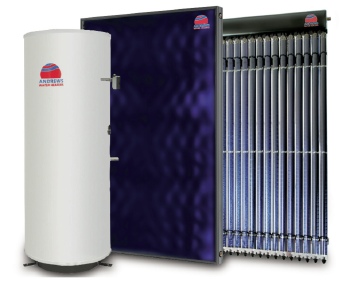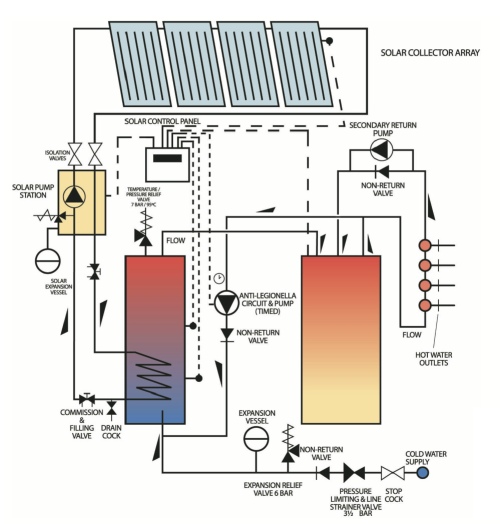Efficient and safe DHW

The wider use of low-carbon heat sources to produce domestic hot water necessitates a considered approach to risk control. Jeff House of Baxi Commercial Division explains.
For designers and building operators, minimising the risk of Legionnaires’ Disease is a key concern. In the case of hot-water systems, especially where low-carbon heat sources provide part load, design and operation require a considered approach to risk control. However, this does not need to be at the expense of efficiency.
The bacterium legionella pneumophila is common in natural water sources, but usually in low numbers. Under certain conditions bacteria can proliferate in pipework, ductwork, or storage vessels and, of particular relevance to our products, hot-water systems. This can represent a risk of infection wherever water droplets can be dispersed in an aerosol — typically spray taps, showers, pressure washers and the like.
HSE Approved Code of Practice L8 and CIBSE TM13 offer robust guidance to help identify, minimise and manage the risk of legionella growth in hot-water systems. It is recognised that water temperatures between 20 and 45°C offer ideal conditions for growth of legionella bacteria, so both guidance documents recommend a regime of thermal disinfection coupled with system cleanliness checks and minimising pipe-work distribution dead legs during design — all well established control methods.
Legionella control has become topical again owing to the increasing complexity of hot-water systems with integrated low-carbon heat sources providing pre-heat or part load duty. A thermal-disinfection control strategy in such instances requires thorough consideration and an understanding of the prevailing water temperatures in each part of the system.
To get the best efficiency from heat pumps or solar thermal it is good practice to include a dedicated pre-heat cylinder, the outlet of which is then fed into a direct-fired water heater or other peak-load hot-water generation to boost the delivery temperature to 55°C. This enables the low-carbon heat source to operate at lower temperatures, which in the case of heat pumps is essential to ensure an acceptable coefficient of performance during winter. In the case of solar thermal the available energy fluctuates throughout the year, leading to variable store temperatures. In both cases the pre-heat store could contain warm water within the 20 and 45°C range for extended periods — so it is important that the storage cylinder(s) and secondary return circuit are pasteurised at an elevated temperature over 60°C to a controlled schedule in accordance with published guidance.
In the case of solar-thermal systems, pasteurisation should ideally be carried out using energy from the solar collectors. However, this may not be possible year round, and some top up energy from boilers or direct fired water heaters may be required to perform this task. Often this leads to system controls set as such to enable supplementary heat to perform disinfection at all times. Given the low standing loss of a modern cylinder, this can result in the pre-heat store remaining at the control target temperature for the following day therefore preventing transfer of solar gain from the collector array, negating any efficiency benefit this may bring.
Clearly safety is of paramount importance, but a considered approach to automated control can ensure a safe and efficient system. By employing an holistic approach to system design and component selection, leading manufacturers can offer a complete packaged solution with low-carbon and peak-load heat sources included. Provided with dedicated controls and pump circuits, such packages offer a programmable thermal disinfection regime which will optimise the available input heat sources and hold off gas heaters unless absolutely necessary.

Also linked to the control of legionella is lime scale, the build-up of which must be avoided as part of a documented system cleanliness regime.
UK water quality is variable, with a recent marked increase in hardness in defined geographical areas. Some water suppliers are now dosing with polyphosphates in order to meet the new permissible lead levels in water supplies from 2013, and to ensure the water heating system operates effectively and efficiently. Particular attention should be given to the type of water treatment used.
Not only does lime scale present an issue with regard to legionella control, but it can also affect the efficiency and longevity of system components. Indeed, BS 8558 section 4.3.48 states, ‘When hard water is heated, bicarbonate decomposes, and calcium carbonate is deposited in the heater and associated pipe work. Whilst this can cause blockage and equipment failure, it also coats the heating surfaces, effectively insulating them so that the efficiency of the heater is impaired. Tests have shown that this can reduce the heater efficiency by up to 30%.’
All of which leads back to effective maintenance, which, in the case of hot-water systems, not only ensures continued efficiency throughout the life of the installation but is also an essential part of the prevention of legionella infection.
Jeff House is marketing and applications manager for Baxi Commercial Division









